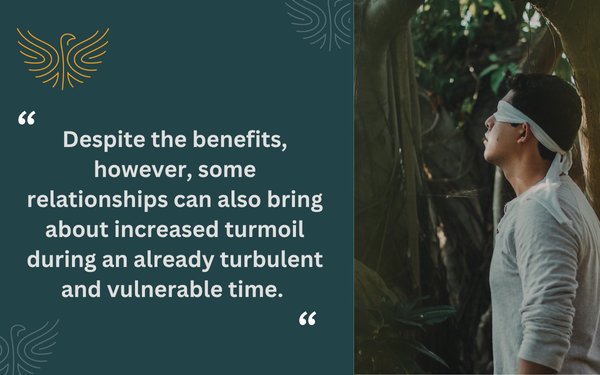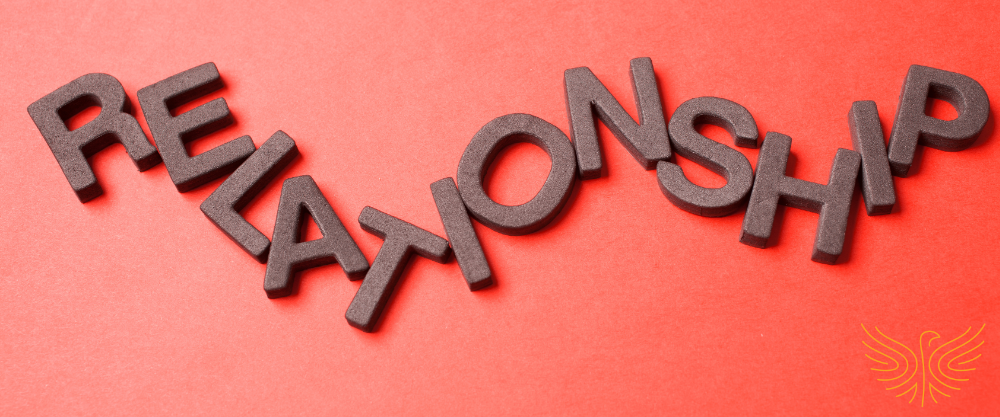Healthy relationships and strong social support are vital parts of the recovery journey. But when it comes to romantic relationships, the answer isn’t always simple.
While connection can be healing, relationships also bring emotional challenges that may feel overwhelming in early recovery. So, how do you know what’s right for you? What should you consider here? Below, we take a closer look at the pros and cons, as well as the intricate factors at play when considering continuing (or starting) a relationship in recovery.
_______________________________________________________
Is It Okay to Be In a Relationship While Healing?
Whether or not to pursue or stay in a romantic relationship during recovery doesn’t have a universal answer. Each person’s recovery journey is different, shaped by factors like how long they’ve been sober, the nature of their addiction, mental health, and personal circumstances.
Recovery is, ultimately, about rebuilding your life, finding healthier ways to cope, and learning to manage emotions without turning to substances. During this vulnerable time, relationships can either help you grow or hold you back. The most important thing is to be honest with yourself about where you are in your recovery and whether a relationship is serving you or not during this fragile time.
The Benefits of a Relationship While in Recovery
A caring partner can offer emotional stability, encouragement during tough times, and a sense of purpose beyond addiction. In fact, just knowing someone believes in you can boost your motivation and help you stay committed to sobriety.
Relationships also give you a chance to build key life skills—like communication, setting boundaries, handling conflict, and showing empathy. These are not only important in relationships but also essential for long-term recovery.
Being in a loving relationship can also help fill the space that substances once occupied. The natural feel-good chemicals released through real connection can offer a healthy and meaningful alternative to the highs of addiction, especially as your brain begins to heal and find joy in everyday experiences again.
The Potential Downside
Despite the benefits, however, some relationships can also bring about increased turmoil during an already turbulent and vulnerable time. Generally, early recovery is an emotionally intense time, and romantic relationships can add extra challenges. Stress from breakups, arguments, jealousy, or other relationship issues can stir up strong emotions—the same ones that may have once led to substance use. In other words, they can sometimes be unhelpful, as well as distract you from what matters the most: your recovery.

Codependency also represents another major concern. People in recovery may gravitate toward partners who enable their behaviors or create unhealthy dynamics. Similarly, they might become overly dependent on their partner for emotional stability, creating an unbalanced relationship that could collapse under pressure.
New relationships can also become distractions from recovery work. The excitement and emotional intensity of a new romance might seem more appealing than the difficult, often uncomfortable process of personal healing. This can lead to avoiding necessary therapy, skipping support group meetings, or neglecting other aspects of recovery.
Lastly, relationships often require significant mental and emotional energy, which, during the early phases, especially, you might not have to give.
_______________________________________________________
Existing Relationships vs. New Relationships
There’s a significant difference between new and old relationships. For instance, existing relationships often carry significant baggage from your active addiction period. Trust may be broken, communication patterns may be unhealthy, and resentment may have built up on both sides.
However, these relationships also have history and deep emotional connections that can be worth salvaging. Partners who stayed through your addiction may demonstrate genuine commitment and love, providing a strong foundation for rebuilding.
Repairing relationships is also a fundamental component in recovery. It often requires honest conversations about past hurts, establishing new boundaries, and proving your commitment to change through consistent actions. Inevitably, this can take work. But for individuals who may have a lengthy history, children involved, and more, this may be worth the effort.
On the other hand, new relationships, while free from addiction-related trauma, bring their own set of complications. You’re still learning who you are in recovery, making it challenging to present an authentic self to a new partner. There’s also the challenge of when and how to disclose your addiction history, which can feel vulnerable and potentially lead to rejection. In many cases, focusing on yourself over a new romantic relationship is ideal, especially during those initial first steps. But, again, it varies from person to person.
_______________________________________________________
Making the Right Choice for Your Recovery
Choosing whether to start or stay in a relationship during recovery is a personal decision that takes time. What’s right for you depends on your unique situation, where you are in your recovery, and how emotionally ready you feel.
Ensure you consider your recovery timeline and stability. If you're still experiencing frequent cravings, mood swings, or struggling with basic daily routines, adding relationship complexities might be overwhelming. However, if you’ve established solid coping mechanisms and consistent sobriety, a supportive relationship could enhance your progress.
If you have any questions or concerns, our team at Freedom Recovery Centers (FRC) is here to help guide you through those tough moments and decisions. Call us at 804-635-3746 or fill out our online form to begin your journey toward sobriety and healing today.
.svg)






.svg)

.svg)



.svg)
